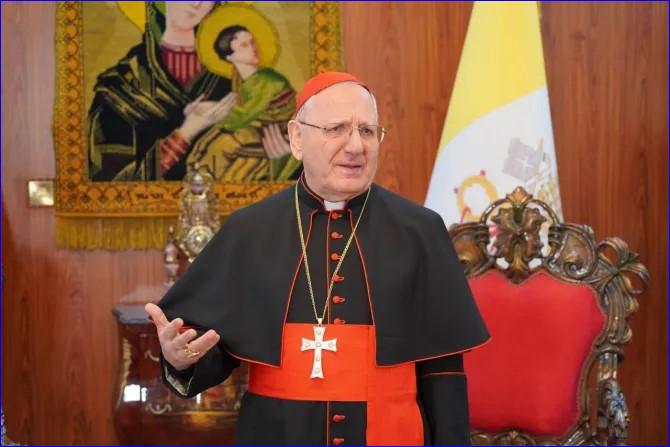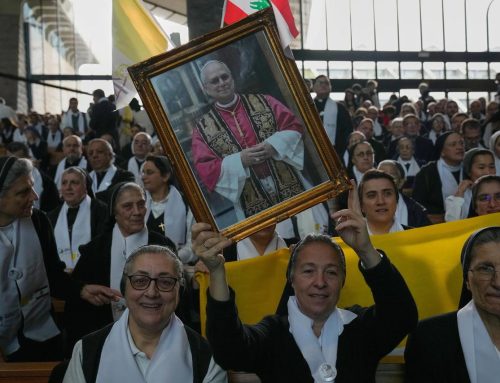The head of the Chaldean Church has accused Iraqi politicians and bishops of inaction and corruption amid the “ceaseless exodus” of the country’s Christian population.
Cardinal Louis Raphaël Sako, the Chaldean Patriarch of Babylon, published an uncompromising statement on Christian emigration in 10 January, accusing the Iraqi government of “double-standards in democracy, freedom, constitution, law and citizenship”.
He said that political failure had caused “a decline in moral and national values” and a deterioration in public infrastructure, driving emigration.
“The Iraqi government is not serious about offering justice to Christians,” he said. “They say nice words and pay lip service, but offer no action.”
Sako criticised the country’s Christian leadership, saying that its political representation had been compromised by the Babylon Brigades — a nominally Christian militia backed by Iran, which has made public attacks on the patriarch. Sako said that “national, tribal and rural fanaticism” undermined efforts to unite Christians.
The Chaldean Church is the largest of the 14 denominations and communities among Iraq’s 250,000 Christians, and Sako has previously encouraged other Churches to cooperate or amalgamate with it. These had failed, he said in his statement, “due to the inability of some clergy to make critical decisions and the exploitation of the Babylon movement which played a role in deceiving some bishops through temptations of money, power and leadership opportunities”.
He also said that the apostolic nuncio to Iraq, Archbishop Mitja Leskovar, had been unable “to play a positive role in bringing the Churches of Iraq together” because of “his lack of understanding of Eastern mentality and culture”.
Although he did not name any bishops, Sako defined two groups for criticism. The first, he said, “act is if everything is ‘passing by'” and “adhere to traditional authority and ritual practice in a routine fashion so that their role does not take account of current culture and the pressing needs of the laity”.
The other, he said, were “submissive” and “blinded by money”, adding that “their corruption is known to the people”. These bishops “sit on the fence, monitoring the situation and waiting to see which the wind blows”.
Sako said that “most of the bishops of the Chaldean Church” and the heads of other denominations belonged to a third group, of “brave shepherds, resolute leaders, beacons of light and rays of hope”.
“They do not accept injustice and do not compromise the truth. Their words are direct, resolute and truthful. They defend citizenship, equal rights and moral rectitude.”
These bishops, said Sako, should form a “crisis task force” to secure the future of Christianity in Iraq.
“The Christian parties and Churches must unite. Without unity, the country will lose its indigenous Christian community and the source of its ancient civilisation.”
As he has often argued in the past, Sako said that all Iraqis had a common interest in sustaining the Christian population.
“Iraqis of all creeds aspire to true national reconciliation, rejection of conflict, and the building of a strong civil state: a state of law and institutions, a state that embraces equality of opportunity, a state that preserves national unity and coexistence across all sectors of the religious, sectarian and national society, a state that promotes stability, peace, security and moral rectitude.”
In an article published six days later in Arabic, English and Italian on the patriarchate’s website, Cardinal Sako repeated that Christians were “the heart of Iraq” and “an essential part of its diverse ethnic, social, national, religious fabric”.
Outlining Christian history in the region from before the arrival of Islam in the seventh century, the patriarch said there had been good relations between Christians and Muslims until the recent past.
However, he said that after the war with Islamic State in 2014-17, which displaced 120,000 Christians from the Nineveh Plain, “the central government ignored them completely, to face either emigration or their fate as if they were strangers in Iraq”.
Christians had not returned to the Nineveh Plain, he said, because they continued to face attacks there — including from the Babylon Brigades.
While the conflict between Sako and the Babylon movement has been portrayed as an intra-church conflict, the patriarch insisted that the Babylon leader Rayan al-Kaldani was “far from true Christian morals” and had bribed those bishops who support him.
“Christians refuse to have Rayan as their leader,” he said.
Sako also said that President Abdul Latif Rashid’s “unprecedented and hasty decision” in July to withdraw decrees of “institutional recognition” for the patriarch — and later for other heads of churches — was done at the Babylon movement’s instigation.
He demanded “practical measures to bring justice to Christians” and guarantee them “a better future in terms of security and dignity” in Iraq, specifying the withdrawal of the Babylon Brigades from the Nineveh Plain as the “first measure”.
He called for the Iraqi government to take over the policing of the region and for the Babylon movement to submit to the army.
On Tuesday, an Iranian missile strike hit Erbil, the capital of Iraqi Kurdistan where the patriarch moved last summer in protest at the withdrawal of his decree of recognition.
Sako condemned the attack, which Iran’s Revolutionary Guard claimed targeted an Israeli “spy headquarters” but killed several civilians, including a Christian known to the patriarch.
“These reckless and irresponsible attacks are a blatant violation of the country’s sovereignty and people’s lives, and a grave sin according to Islamic law,” Sako said.
“The responsibility of states, their forums, and peoples is to promote the values ??of peace and coexistence, and to achieve a dignified and happy life for citizens, and not to create wars and conflicts that do not bring peace. The civilised method for resolving outstanding problems is dialogue, tolerance and mutual respect.”
Pope Francis also expressed his “sympathy and solidarity” with the region and urged all parties “to avoid any step that increases tension in the Middle East and other warzones”.
By:aina






